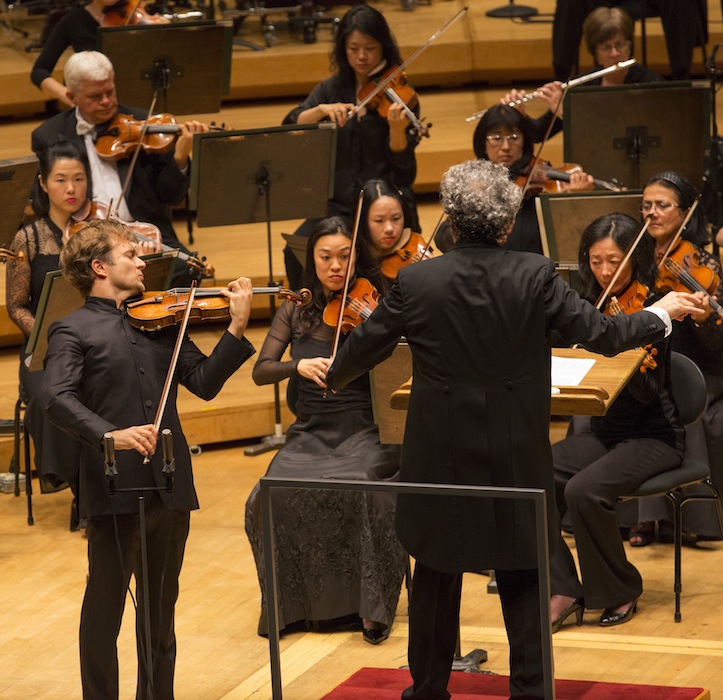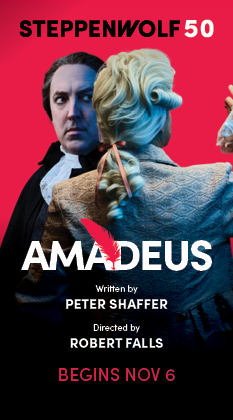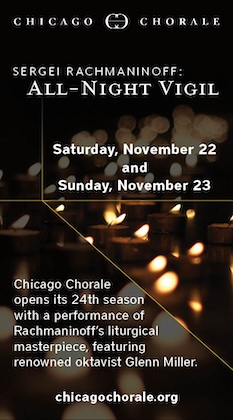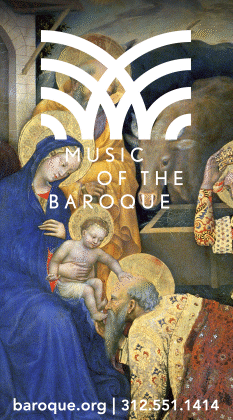Capuçon’s fiery playing sparks Bychkov’s Brahms program with CSO

Semyon Bychkov returned to the Chicago Symphony Orchestra podium Thursday night, the first CSO podium guest of the 2015-16 season. The Basically Brahms program may not have showed much imagination on paper but was spiced by a superb solo outing and an apt contemporary work, Detlev Glanert’s Brahms-Fantasie, heard in its U.S. premiere.
Bychkov introduced Glanert’s music to Chicago audiences five seasons ago with the German composer’s Theatrum beastiarum, a powerful, darkly brilliant ride.
The Brahms-Fantasie was one of four works commissioned by the BBC, each to be performed on the same program with one of the Brahms symphonies. Glanert’s work was designed to be partnered with Brahms’ Symphony No. 1, as it was Thursday night.
As suggested by the subtitle, “Heliogravure for Orchestra,” Glanert’s music overlays his restless modern style onto a Brahms-size orchestra. In the surging ebb and flow Brahms handprints and rhythmic motifs are discernible, as if through a distorted aural mirror. Pizzicatos echo the finale of the First Symphony, organ-like string sonorities suggest Brahms’ lesser-known organ music, and a Hungarian Dance fragment morphs into a jazzy hoedown with virtuosic double bass slides.
Yet Glanert entirely avoids pastiche and name-that-tune shtick. His Brahms-Fantasie is a smart, striking music gracefully putting an edgy contemporary sensibility onto music of the past. Bychkov drew an imposing, flexible and transparent performance from the orchestra. Why doesn’t the CSO commission a substantial work from this gifted composer?
Renaud Capuçon was the soloist in the evening’s centerpiece, Brahms’ not unfamiliar Violin Concerto. The French violinist was even more successful than in his last CSO appearance in the Brahms Double Concerto with cellist brother Gautier in 2012. One could hardly imagine a greater contrast in Capuçon’s fully committed performance than with Pinchas Zukerman’s somnambulist act in the same work three years ago.
Capuçon brought notable freshness to the concerto with a finely judged blend of sweetness and sinew. There was ample youthful fire in the opening movement with the drama reflected in the synergy between the soloist and Bychkov’s hard-charging accompaniment.
The Adagio was launched with a relaxed bucolic oboe solo by guest Jonathan Fischer, principal of the Houston Symphony. Capuçon’s tender phrasing consistently beguiled the ear in this music, with a natural, nostalgic accompaniment by the orchestra under Bychkov. If the dance-like element wasn’t always evident in the finale, the roiling full-blooded performance provided a suitable payoff with Capuçon’s bristling bravura a fine match for Bychkov and the energized orchestra.
Brahms’ Symphony No. 1 closed the evening. At time one wanted a bit more interpretive idiosyncrasy yet Bychkov’s firm yet flexible direction made for a dramatic, forcefully projected performance. The opening movement went with a tough implacable quality, Bychkov drawing weighty textures from the orchestra. Yet the conductor also brought out the lyricism in a warmly expressive Andante, with sensitive solo contributions by oboist Fischer, clarinetist John Bruce Yeh and concertmaster Robert Chen.
After a hearty and vigorous Allegretto, the performance culminated in a combustible finale. Following the tension of the opening bars, Daniel Gingrich lofted a noble horn solo and Bychkov and the players ratcheted up the tension and adrenaline to a fever pitch with a raw intensity infrequently heard in this repertory.
The program will be repeated 1:30 p.m. Friday and 7:30 p.m. Tuesday. cso.org; 312-294-3000.
Posted in Uncategorized





